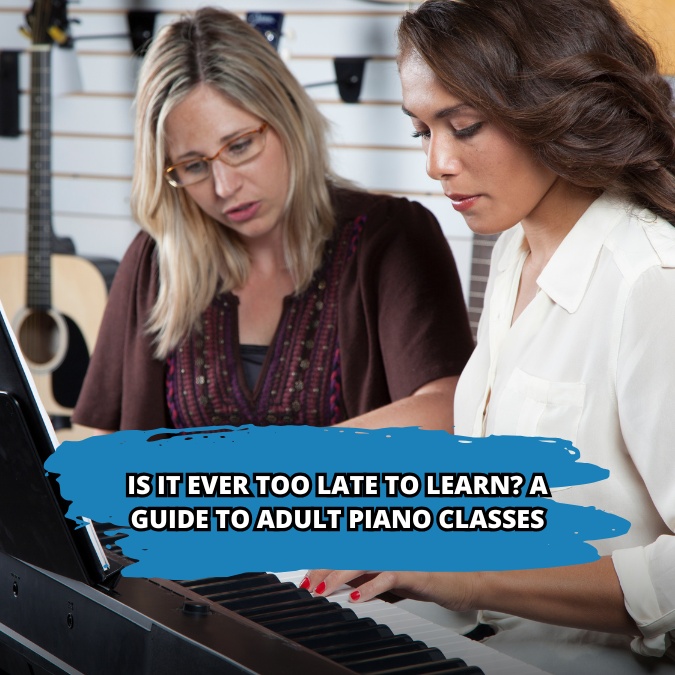Is It Ever Too Late to Learn? A Guide to Adult Piano Classes

Introduction to Adult Piano Learning
Breaking the Myth: Learning Piano as an Adult
Many people believe that learning the piano is something best done in childhood, but adult piano classes have proven this myth wrong. Adults possess certain learning advantages, like discipline and focus, that can make picking up new skills smoother and more structured. Learning as an adult can also be uniquely satisfying because many learners feel a deeper sense of purpose and engagement. While the learning process may be different, adults are more than capable of excelling in piano.
Why Adults Are Choosing to Learn Piano
Adult piano classes appeal to a range of people seeking a new hobby, a creative outlet, or even a way to relieve stress. Many adults choose piano for the therapeutic effects music can bring, which helps them unwind and relax. Adults also appreciate the challenge and mental stimulation that learning an instrument provides. For some, it’s a way to reconnect with a childhood passion or to fill a gap they’ve felt in their lives.
Benefits of Starting Piano Later in Life
Adults who start piano classes often notice increased focus, memory, and emotional well-being. Playing the piano requires attention and fine motor skills, which helps improve brain function over time. Learning piano can serve as a form of active meditation, helping reduce stress and increase happiness. Adult piano learners also tend to find that their patience and resilience grow as they progress, improving their overall quality of life.
The Unique Advantages of Adult Piano Classes
Cognitive and Emotional Benefits for Adults
Studies show that music learning can delay cognitive decline, making adult piano classes especially beneficial. Playing piano can help adults improve their memory, attention, and ability to process complex information. Beyond cognitive benefits, playing music also provides emotional rewards, as it allows adults to express themselves creatively and experience joy in mastering new pieces. Emotional resilience and satisfaction increase as they witness their progress and musical growth.
Tailored Learning Pace and Flexible Scheduling
Adult piano classes are typically designed to accommodate busy schedules and allow flexibility. Unlike children’s programs, adult classes often provide personalized pacing, which is essential for working professionals or retirees with time constraints. This flexibility makes it easier for adults to maintain consistency in their learning. Additionally, adults can work with instructors to set goals that fit their abilities and schedules, promoting a sustainable and enjoyable learning process.
Building Confidence and Creativity Through Music
Learning piano helps build confidence as adults tackle challenges and achieve musical milestones. Adult piano classes encourage students to explore their creativity through improvisation or personal interpretation of pieces. For many, playing piano becomes an expressive outlet that strengthens their connection with themselves and others. With each piece mastered, learners gain a sense of pride that extends beyond the music and positively impacts other areas of life.
Addressing Common Concerns and Challenges
Time Constraints: How to Make Time for Practice
Time management is a significant concern for many adults considering piano classes, but there are ways to make practice a part of their routine. Breaking practice sessions into smaller, manageable chunks can make a big difference in progress. Setting aside just 15-20 minutes a day, even with a busy schedule, is often enough to see steady improvement. Many find that creating a practice routine makes piano learning an enjoyable part of their daily life.
Physical Limitations and How to Overcome Them
Some adults may face physical limitations, such as reduced finger flexibility or joint pain, but adult piano classes can accommodate these needs. Instructors can tailor exercises to help improve hand strength and finger coordination at a comfortable pace. For adults with arthritis or similar issues, ergonomic techniques and hand warm-up exercises can make a significant difference. These adjustments enable learners to play with ease and continue progressing without strain.
Fear of Failure and Ways to Stay Motivated
The fear of making mistakes can deter adults from starting piano classes, but overcoming this fear is essential. Adults should focus on personal progress and celebrate small achievements along the way. Setting achievable goals and practicing patience are key to building resilience and long-term motivation. Regularly reminding themselves why they wanted to learn piano can help adults stay inspired and dedicated.
Choosing the Right Piano Class as an Adult
Types of Piano Classes: In-Person, Online, and Hybrid
Adults can choose between in-person, online, and hybrid classes, depending on their lifestyle and preferences. In-person classes offer face-to-face guidance and a more personal connection with instructors. Online classes provide convenience and flexibility, making it easy to learn from home. Hybrid classes combine both formats, allowing adults to benefit from structured in-person sessions while maintaining flexibility. Each format has unique advantages, allowing learners to find a setup that best fits their needs.
Key Considerations: Teaching Style, Class Size, and Goals
When choosing adult piano classes, teaching style is crucial as it determines how well the student connects with the instructor. Some adults prefer a structured, goal-oriented approach, while others enjoy a more relaxed and exploratory style. Class size is also important; smaller classes provide more personalized attention, which can benefit adult learners. Finally, considering personal goals helps adults find classes that align with what they want to achieve musically.
Questions to Ask When Selecting an Adult Piano Class
Asking the right questions can help adults find a piano class that matches their expectations. Some essential questions include: “What is the class structure?”, “How often are lessons held?”, and “What is the teacher’s experience with adult learners?” Other inquiries might involve the practice expectations, the pace of learning, and available materials. Knowing these details can help adults make a more informed decision that suits their learning style and lifestyle.
What to Expect in Your First Adult Piano Class
Lesson Structure and Basic Techniques
Adult piano classes typically begin with basic techniques such as hand positioning, scales, and simple chords. Instructors introduce these fundamentals to help learners build a solid foundation before moving to more complex pieces. Classes also emphasize rhythm and timing to ensure that learners understand the pace of each piece. By focusing on these basics, adults can develop essential skills that make future learning easier and more enjoyable.
Tips for Building a Solid Practice Routine
A consistent practice routine is key for progress in piano, and adults can establish this by setting clear goals and creating a comfortable practice space. Even with a busy schedule, practicing regularly—even briefly—can lead to improvement. Setting specific, achievable goals, such as mastering a new scale or practicing a short piece, can keep learners motivated. A structured routine enables adults to make steady progress while balancing other commitments.
Developing Patience and Persistence in Learning
Adult piano classes encourage patience, as learning a new skill takes time and persistence. Understanding that progress will come with consistent effort helps adults stay motivated. Rather than focusing solely on perfection, learners are encouraged to enjoy each step of the journey. Embracing the learning process, with its ups and downs, allows adults to develop both musical skills and personal resilience.
Practical Tips for Staying Consistent and Enjoying the Process
Setting Realistic Goals for Piano Progress
Setting achievable, realistic goals is essential for staying consistent and motivated in adult piano classes. Instead of aiming for immediate proficiency, adults should focus on gradual improvement. By setting weekly or monthly goals, they can celebrate small wins that lead to steady progress. Regular reflection on these goals can help adults stay on track and recognize how far they’ve come.
Finding Joy in the Small Wins Along the Way
Enjoying the small successes, like mastering a new chord or playing a song without mistakes, can make the learning experience more rewarding. These moments of achievement help build confidence and remind adults why they began their piano journey. Celebrating these small wins provides motivation and keeps learners excited to continue practicing and improving.
Maintaining Long-Term Motivation for Practice
Long-term motivation is crucial in adult piano classes, as consistent practice over time yields the best results. Finding ways to stay inspired, such as exploring new music genres or learning favorite songs, can keep adults engaged. Adults may also benefit from periodically reflecting on their goals and progress to appreciate how their skills have grown. This sustained motivation makes the learning process enjoyable and fulfilling.
Final Thoughts: Why It’s Never Too Late to Start
Embracing the Journey of Lifelong Learning
Adult piano classes highlight the idea that it’s never too late to start learning. Piano is a journey of self-discovery that brings joy and mental stimulation. Embracing the process, rather than focusing solely on results, allows adults to enjoy every part of their progress. Lifelong learning enriches life, adding a sense of purpose and fulfillment.
Encouragement for Aspiring Adult Pianists
Taking the first step into adult piano classes is an act of courage and curiosity. The journey may come with challenges, but each small achievement makes it worthwhile. For those wondering if they should start, the answer is that it’s always a good time to learn something new. Aspiring adult pianists can find immense joy and pride in this creative pursuit.
Q: What age is too old to start adult piano classes?
A: There is no age limit for starting adult piano classes. Many adults find learning piano enjoyable and fulfilling at any age, whether in their 30s, 50s, or even 80s.
Q: How long does it take to learn piano as an adult?
A: Learning piano as an adult varies based on practice frequency and goals, but most beginners can start playing simple songs within a few months. Regular practice helps adults build skills gradually, leading to steady improvement over time.
Q: Can I learn piano if I only have a keyboard?
A: Yes, you can learn piano effectively on a keyboard, especially when starting out. Many adult piano classes support keyboard learning, and it’s a convenient, affordable option for beginners.
Q: Do I need a private teacher for adult piano classes?
A: While private teachers can offer personalized guidance, many adults find group or online classes equally beneficial. The choice depends on personal preference, budget, and learning style.
Q: How much should I budget for adult piano lessons?
A: Adult piano lesson costs vary widely, ranging from $30 to $100+ per session, depending on the location and instructor’s experience. Many online platforms also offer affordable options with monthly subscriptions.


